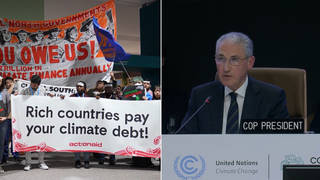
A new Oxfam analysis released as the leaders of the Group of 7 nations met in Hiroshima, Japan, shows G7 countries collectively owe poor nations in the Global South more than $13 trillion in development and climate assistance. But instead, these countries are saddled with daily debt repayments of $232 million, deepening the global chasm of inequality. That debt burden “is essentially the money that could have been invested in education, in health, in gender justice programs, in ensuring safe drinking water, in climate resilience,” says Amitabh Behar, the interim executive director of Oxfam International, speaking from New Delhi.
Transcript
NERMEEN SHAIKH: We end today’s show with a new Oxfam report that shows G7 countries collectively owe poor nations in the Global South more than $13 trillion in development and climate assistance, but instead, these countries are saddled with daily debt repayments of $232 million, deepening the global chasm of inequality.
To talk more about this, we go now to New Delhi, India, where we’re joined by by Amitabh Behar, interim executive director of Oxfam International.
Welcome to Democracy Now!, Amitabh Behar. If you could lay out what this report found, the Oxfam report?
AMITABH BEHAR: The report is essentially talking about how we need to really relook at the narrative. The current narrative where we talk of G7 as these charitable global leaders, which actually should be getting resources in terms of debt repayment from the low- and middle-income countries, needs to be completely transformed. You know, we need to change the gaze. The gaze is, essentially, where we need to look at what do the G7 countries owe to the poor and the middle-income countries. So I think that change is critical.
And as you said, our report clearly says that the G7 countries owe $13.3 trillion to the low- and middle-income countries. So, that’s massive. So, this is in the form of the nonpayment of aid and not putting resources in climate action. So, that’s really the story. And when the G7 met in Hiroshima, they were talking about zero hunger, they were talking of climate action, but they did not really look at what their responsibility is.
NERMEEN SHAIKH: And, Amitabh, if you could elaborate on that? You’ve said the huge costs from climate damage caused by the, quote, “reckless burning of fossil fuels by rich countries needs to be addressed here as part of the debt.” What are you calling for?
AMITABH BEHAR: Well, if you look at, as in — if you look at the commitments that were made by G7, they said, from ’22 to ’25, they were going to invest $100 billion every year. And we have not really seen that money come.
And if you increasingly look at the massive damages happening because of the climate crisis, particularly in the South, somebody needs to take responsibility for that. And it’s fairly clear, report after report, that the G7 countries are significantly responsible for these emissions. And at this moment, as our report says, that they almost owe $8.7 trillion in terms of loss and damages. So, that’s something that must be put up front by the G7 countries, but that’s not happening.
And then, the second part is that in 1970, the G7 countries agreed to a 0.7 of GNI as ODA. But we have, ’til now, not even seen half of that money getting realized. So there are massive shortfalls, deficits in terms of the money that G7 owes to the developing countries.
NERMEEN SHAIKH: And, Amitabh Behar, if you could explain what the concrete effects of these crippling debt payments are on the Global South? This comes as a global hunger crisis has risen for the fifth consecutive year. Talk about the impact on individual states of these debt repayments and where the money is taken from to repay the debt.
AMITABH BEHAR: Absolutely. I think that’s also very central to our report, that the $230 million that goes out every day in terms of debt repayment, which is going to go to the coffers of the G7 countries and also a lot of rich bankers, is essentially the money that could have been invested in education, in health, in gender justice programs, in ensuring safe drinking water, in climate resilience. But that’s the money that’s going back to the G7 countries.
And this is happening in the context of the polycrisis that we are witnessing. As you’ve said, a fifth year we are seeing in a row where hunger is rising. Almost 280 million-plus people sleep hungry every night. And this is the time when this whole debt crisis is being talked of. And, you know, this is also in the context of the fuel crisis. You’re looking at inflation. So, even the cost of debt repayment is going higher as the dollar cost goes up. So, in the context of the polycrisis, this is really hypocrisy to say that G7 is taking global leadership, while it’s the schools and the public health system, safe drinking water, which is getting taken away from the poor and the excluded communities.
NERMEEN SHAIKH: And, Amitabh, we just have 30 seconds. If you could say how humanitarian aid fits into it, the inadequacy of it, and what needs to be done?
AMITABH BEHAR: It’s extremely inadequate. It’s fairly clear that the need for humanitarian aid is just growing. And that’s growing because what we are looking at — you know, the polycrisis is also in terms of inequality, the climate crisis, conflicts. These are all coming together. And at this juncture, the humanitarian aid is galloping in terms of the need manyfold. But the commitments are very, very hollow. And that’s really —
NERMEEN SHAIKH: I’m afraid we’re going to have to leave it there, Amitabh Behar, interim executive director of Oxfam International, speaking to us from Delhi. And that does it for the show.













Media Options